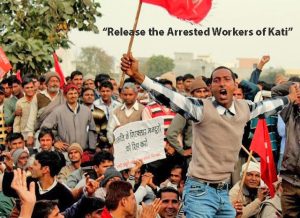
India: Auto Workers Fight Wage Slavery
CHENNAI (India), June 19— “Harsh working conditions and constant monitoring by cameras on the production lines are making me angry and determined to get our communist Red Flag delivered to workers’ dormitories and hostels,” said a Hyundai trainee worker who joined ICWP last year.
Comrades had shared the story of Suzuki workers in India at our ICWP collective meeting.
Harsh working conditions and extensive hiring of low-paid contract workers are ruining families’ lives. Nine hundred workers rebelled. They earn $129 a month, less than half the minimum wage. The company brought in three hundred armed private security guards. The sprawling Suzuki plant, which occupies over 600 acres and produces 800,000 cars annually, came to a halt.
The autoworker collective in Chennai has faced similar harsh conditions. Last year, Hyundai introduced a new model. The company awarded a yearly laundry allowance “bonus” of just $38 to every employee. However, these workers produced one million cars annually, generating $700 million in profits for the company.
A comrade said, “Last year, Hyundai reduced the workforce by 14%. That is, 1600 workers are unemployed. Now, there are rumors of an economic slowdown. We will be the first to be affected.”
Another comrade added, “The economy is based on making maximum profit. But maximum profit also creates maximum misery to the masses.”
Anti-Racist Struggle Opens Doors to More Communist Organizing
A comrade who joined ICWP five years ago said, “Capitalist bosses have learned to divide the working class by caste, religion, ethnicity, language, gender, nationality, and more. They make workers feel jealous, weak, greedy. They create the education, culture, and fashion industries to get us to accept the system as it is.
“But when we work long hours in a factory like Hyundai, we see our power for a change,” he continued. “Recently, a worker from Assam was mistreated by his supervisor. The supervisor abused him, calling him ‘Chinese,’ ‘ugly,’ and ‘lazy.’ ”
Workers knew the worker as very friendly. During a lunch break, workers discussed this racist attack. Soon, hundreds of workers became aware of it. They warned the supervisor. The supervisor came with an armed bodyguard. That made workers very angry. “After a lunch break, we organized a protest to stop work. The management backed off and reassigned the racist supervisor.”
This provided us with a significant opportunity to distribute Red Flag to workers’ homes. We explained that reassigning a supervisor was not the solution. We must change the whole system of capitalism that demeans workers. We need communist revolution to get rid of the capitalist system as a whole that breeds racism and exploitation.
Workers were very open to our ideas. They started reading articles on Gaza. Many knew about the atrocities and genocide in Gaza. After the incident with the supervisor, everyone wanted to know more about Gaza and our comrades in Israel. They showed interest in the stories of our party in South Africa, the work in El Salvador, and the attacks on immigrants in the US.
An ICWP comrade told a very inspiring story. In the year 1690, the British established colonial power in Madras (now Chennai). Elihu Yale was the governor and president of the East India Company. He conducted a brutal regime of slave trade, genocide, and colonial plunder. He was so cruel that the British had to repatriate him. He took his ill-gotten fortune to the US and established Yale University. Yale University graduates have since included some of the next generations of ideologues and defenders of capitalist brutality.
The comrade told this story because the Gaza comrade inspired him to talk about a communist revolution. From Gaza to Chennai, we need communism. Join our comrades in reading and spreading Red Flag to change the world.
Pamphlet: Wage Slavery, Crisis, and the US Auto Industry here

